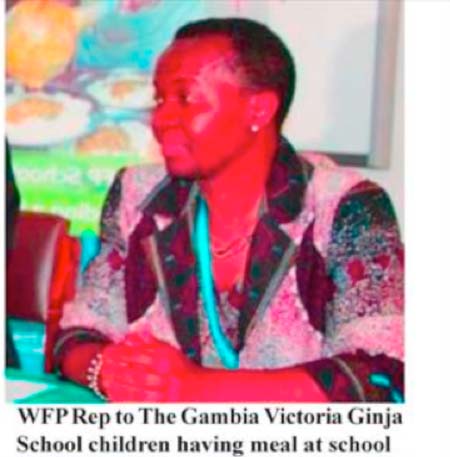
Speaking at the meeting, the WFP country representative, Victoria Ginga, said the UN Secretary General recently highlighted how zero hunger is linked to poverty reduction, social protection, gender equity, both sustainable production and consumption, and partnerships.
For this reason, she went on, WFP is moving from a project-based approach to a programme-based approach, which focuses more on building synergy where no one is left behind.
“We seek to contribute to strengthen national and regional capacities, and to support hunger-related safety net programmes such as school meals, nutrition support, and livelihood-linked activities.”
In his remarks on the occasion, Abdoulie Jallow, from the Ministry of Finance and Economic Affairs, spoke on the WFP’s Country Programme 2017-2021 and the theme: “Zero Hunger Challenge.”
He acknowledged the joint efforts within the framework of the Programme for Accelerated Growth and Employment (PAGE) and UNDAF geared towards attaining the national development objectives.
“The consultative meeting gives us the opportunity to further enhance our coordination and collaboration as we prepare the PAGE successor (National Development Plan), a new UNDAF, the UN S System’s country programme document, and also mainstreaming the SDGs into our development planning processes.”
He added: “This platform offers potential for both Government and WFP to explore areas of complementarily, and to determine the possibility of synergy in safety net interventions taking into consideration our commitment to the SDG’s agenda and its inclusiveness in terms of ‘leaving no one behind’”.
They welcome the shift by WFP from international purchase of inputs for school meals to a home-grown school feeding programme, he said.
Apart from improving attendance and learning outcomes, the initiative would help to expand the market for smallholder farmers and, hopefully, enhance production and productivity, he continued.
Isatou Oba from the office of the Secretary General and head of the civil service, said the meeting was organised within the partnership framework that exists between the World Food Programme country office and the government of The Gambia.
It would depend more on technical sessions to review the collective strategies, and to come up with a clear partway in guiding their efforts for the coming years, she added.
The partnership continues to grow from strength to strength, due to the strong support the WFP is rendering by intervening both directly and indirectly in complementing the government’s effort in key sectors. The partnership, she added, had over the years registered remarkable successes.
“The Government of The Gambia is cognizant of all the good that WFP has been doing in the country, which dates back 45 years.
“The country office has in collaboration with government stakeholders in the areas of food security, school feeding, Disaster Reduction and Resilience, as well as nutrition successfully implemented two comprehensive Common Country Strategies.”
The milestone achieved under the previous programmes would have to be consolidated, and further strengthened with the operationalization of a 3rd Country Programme Documents spanning the period 2017-2021, she added.

